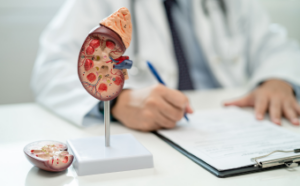My name is Joe Hawkins and I am 59 years old. I am a U.S. Navy veteran and settled in rural Utah after 20 years of service. I am happily married to Janna for nearly 35 years. Since retiring from the Navy, I started a second career working for the Defense Contract Management Agency. Until May 2018, I had never been in the hospital. I wasn’t taking any medications, worked out regularly and was in great health. That all changed when I was diagnosed with membranous nephropathy. At that time, my proteinuria was 14 grams in 24 hours. Between June 2018 and May 2019, I was in the hospital at least a dozen times for everything from sepsis to pulmonary embolisms, including 3 stays in ICU. My original nephrologist tried prednisone, tacrolimus and rituximab, but nothing worked to improve my condition. My eGFR was declining and edema got progressively worse to the point where fluid would weep through my skin every night, soaking the sheets. I couldn’t go up even one step without having my wife’s assistance – resting my hands on her shoulders for support.
In March 2019, my original nephrologist recommended “killing” my kidneys and putting me on dialysis and transplant list. Janna and I left that appointment furious and determined to get a second opinion. In April 2019, I had an appointment with membranous nephropathy experts at the Mayo Clinic in Rochester, MN. The day before we were due to travel, one of my cats barely pierced skin on my arm and hours later, I had a massive infection. I ended up in the hospital for 5 days and had to reschedule my appointment. It was devastating as my eGFR continued to plummet. In May 2019, I had another infection in my legs and was hospitalized days before my rescheduled Mayo Clinic appointment. Janna and I begged the local hospital to do whatever they needed to do to stabilize me for travel. I couldn’t delay a second opinion any longer. I was released in the morning and we departed for the Mayo Clinic later that day. I was so weak from protein loss (now at 21 grams) and carrying around 90+ pounds of water, I was in a wheelchair.
By January 2020, my proteinuria had dropped significantly. We were cautiously optimistic that I was heading into remission. In May 2020, my labs showed I achieved remission, but my wife and I officially celebrated with Dr. Fervenza during my visit in June 2020.
Dr. Fervenza immediately hospitalized me to stabilize my condition before they considered any further immune suppression. I was on IV diuretics for 5 days and antibiotics to continue to treat the infection on my legs. I was sent home on low-dose Bactrim to help prevent further infections and a more effective diuretic to continue to lose edema with a plan to return to Mayo Clinic in 5-6 weeks. In June 2019, I returned to the Mayo Clinic. Dr. Zand noted I was negative for the only two antigens identified at that time and called me a “medical unicorn”. I offered to provide blood and urine for their research. After consulting with Dr. Fervenza, Dr. Zand suggested trying ofatumumab, which was similar to rituximab. I had two IV treatments and then, we waited. In September 2019, we started to notice small changes in my labs that indicated something was happening. Although still very low, my blood albumin was above 2.0 for the first time since diagnosis. By January 2020, my proteinuria had dropped significantly. We were cautiously optimistic that I was heading into remission.
In May 2020, my labs showed I achieved remission, but my wife and I officially celebrated with Dr. Fervenza during my visit in June 2020. When we were at the Minneapolis airport to return home, Dr. Fervenza called me with results of their research. A Mayo Clinic pathologist, Dr. Sethi, had identified the antigen responsible for my case – NELL1. Since this antigen is associated with malignancy, Dr. Fervenza recommended a full work-up when I returned home to Utah. I had a PET scan, colonoscopy, protein electrophoresis, etc. Thankfully, all negative. Years since remission, my condition continues to improve. My eGFR has slowly increased and is 70 with my natal kidneys. I am no longer anemic, and my proteinuria is about 200 mg (at my worst, it was over 100 times higher). I am working out regularly again and no longer need any medications. My goal as a volunteer for NephCure is to provide hope and share lessons learned from my difficult path to remission and recovery.

